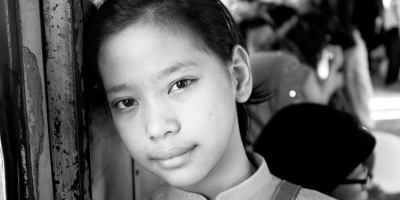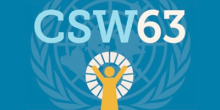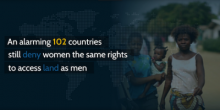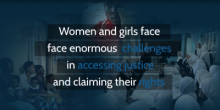
By Raul Cordenillo
Shabnum* makes chappan, a traditional coat worn by men and women in Afghanistan. She starts her day by sewing the cloth into a coat. Thereafter, she embellishes it through intricate needlework with patterns that are popular in Kabul.
To most, Shabnum is a skilled tailor and embroider, who is applying her craft in the city. Unbeknownst to them, however, she is also a survivor of domestic violence and has been living in a shelter after having been referred by the Afghanistan Independent Human Rights Commission. Her business is a result of classes at a women’s protection center victims of sexual and gender-based violence (SBGV) supported by IDLO.
Justice for women survivors of SGBV is fraught with obstacles
What Shabnum went through is not right. Due to the abuses she suffered, she experienced intense effects of trauma and required a safe shelter and related services. Fortunately, she has been allowed access to such a facility.
Women survivors of violence face obstacles in accessing justice. Stigma and discriminatory attitudes often impede the effective investigation and prosecution of such crimes. Institutional infrastructure, such as specialized courts, is not always present or lacks sufficient capacity to handle cases. This justice gap does not just exist in Afghanistan or is related solely to sexual and gender-based violence.
Today, for far too many women, the promise of justice is not fulfilled.
According to the results of the Open Society Foundations’ 2018 Strengthening Access to Civil Justice with Legal Needs Surveys, more than half of women from across 45 countries have experienced a legal problem in the last two years. In countries where the situation of women is worse, i.e. at the bottom of the Women, Peace and Security Index, 60 per cent of women have expressed legal needs.
Other than SGBV, women’s concerns occur not just in the workplace but also in their respective communities and even in their homes. Women face more family-related legal problems than men. These concerns may arise due to discriminatory norms, which are reinforced by uneven legal protections and some customary justice systems. Oftentimes, they are compounded by politico-socio-economic disadvantages, such as poverty, ethnicity and disability
Can informal and traditional systems help women access justice better?
In some countries, particularly in Africa, informal and traditional justice systems are the most readily available and economical remedy, especially for the marginalized or disadvantaged populations. Their use, however, does not always result in justice.
Informal systems are not always aligned with international human rights standards. In some case, they even perpetuate impunity instead of meaningful justice.
Women judges could improve access to justice
Gender diversity in the justice sector can serve as a powerful remedy against trust-deficiencies that plague many conflict-affected environments. Women judges, in particular, play an important role in breaking down many of the barriers that women face in accessing justice. Being more aware than men of gender-specific justice needs across a spectrum of issues, including SGBV, women judges have spearheaded landmark legal decisions in a number of countries which have not only produced tangibly better outcomes for women but also shifted public policy. Despite their positive contributions, however pathways for judicial promotion are blocked by various gender biases.
The 2019 International Women’s Day campaign #balanceforbetter focuses on the need for continuous collective action towards a gender-balanced world. This balance is not solely a woman’s issue as gender-balance is now expected in business, the media, government, the judiciary and beyond.
As a shared responsibility, we all have to do our part to make this happen.
We all have a role to play for #justiceforwomen
IDLO advocates that everyone regardless of gender is equal before the eyes of the law. And it is through the rule of law that the rights of women and men, particularly access to justice, are guaranteed and kept equal.
It is in this context that IDLO champions the advancement of justice for women in order to address the justice gap. This is not just in terms of its advocacy but also in practice through its various programs worldwide. IDLO’s commitment is reaffirmed by IDLO Director-General Irene Khan when she stressed that, “The quality of justice for women improves when women are not only consumers of justice, but also providers of justice.”
IDLO seeks to reiterate its advocacy in the 63rd Session of the Commission for the Status of Women (CSW63) through a series of activities (See Box Below). The Commission is the principal global intergovernmental body dedicated to the promotion of gender equality and the empowerment of women, including through the 2030 Agenda.
At the various meetings, IDLO seeks to reach out to UN Member States, civil society actors and various stakeholders with a set of points that should be acted upon. These include the need to sustain efforts to eliminate legal discrimination against women, which still persist to this day; the importance of putting in place legislation and implementation mechanisms to prevent and respond appropriately to violence against women; the assurance not to leave anyone behind, through provision of legal services and legal empowerment for poor and marginalized women; and the value of strategically working with customary and informal justice systems as a way of addressing the access to justice gap while mindful of their limitations.
Overall, IDLO continues to impress among decision-makers that the rule of law enables gender equality. In so doing, IDLO can do its part in mobilizing the political will and resources for a gender-balanced world as we commemorate 2019 International Women’s Day.
*Not her real name
Photo: (CC) Flickr-Danumurthi Mahendra
More information
The sixty-third session of the Commission on the Status of Women (CSW63) will take place at the United Nations Headquarters in New York from 11 to 22 March 2019.




